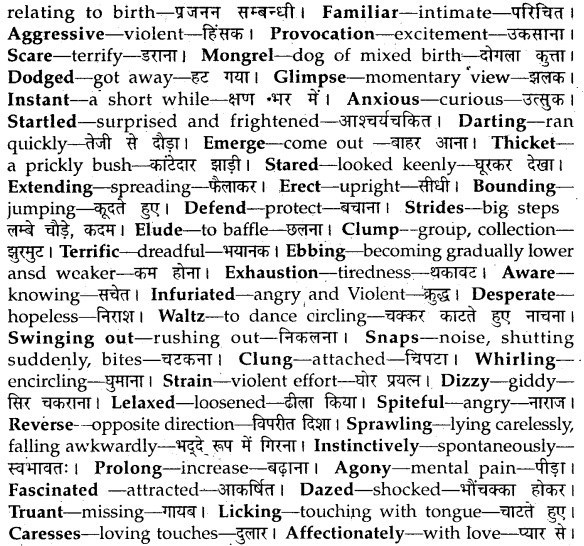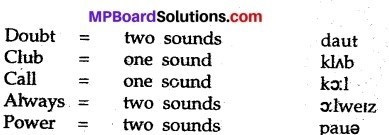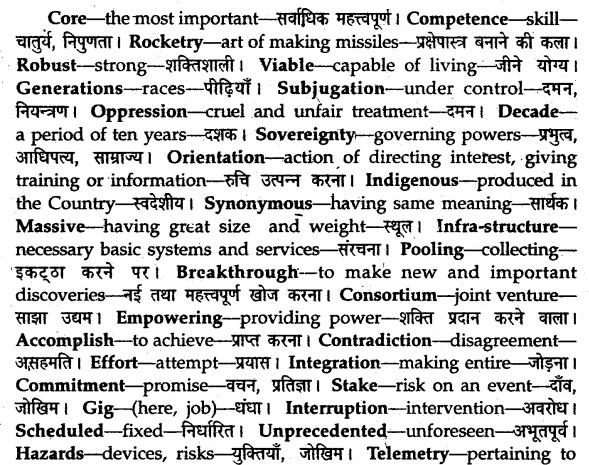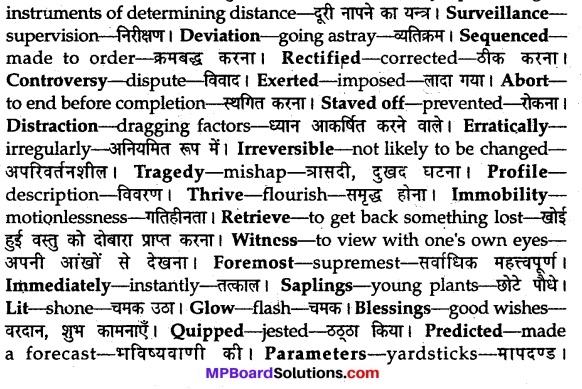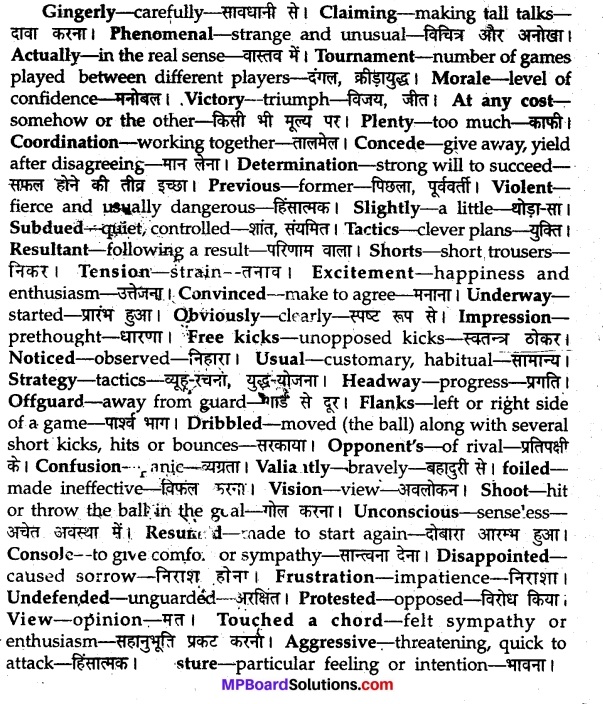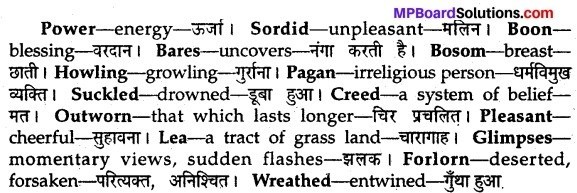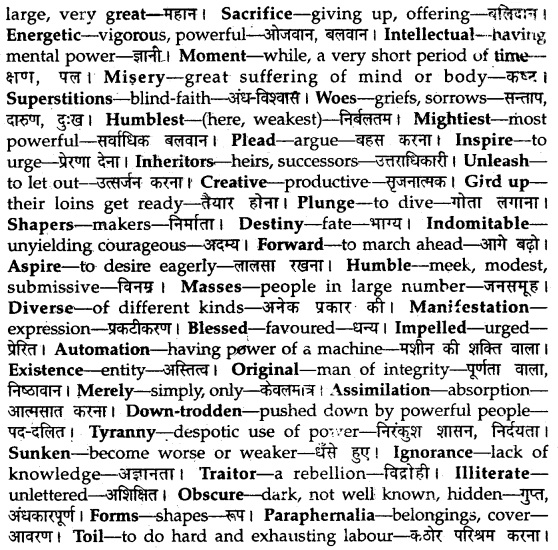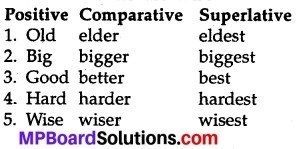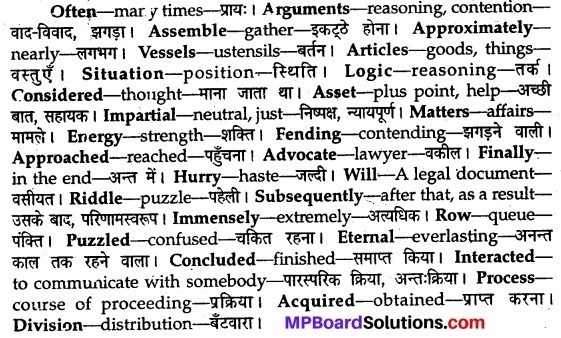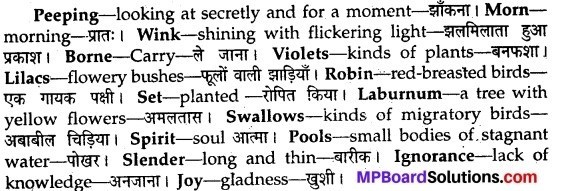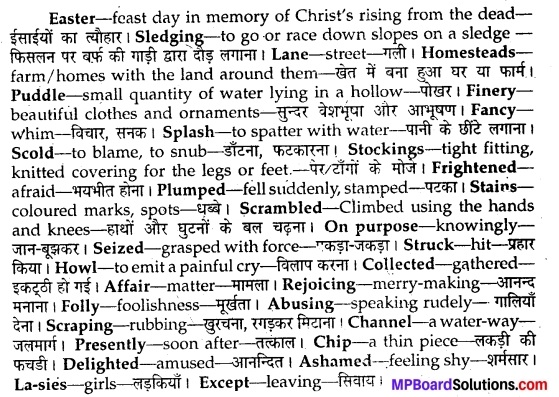MP Board Solutions for Class 9 English The Rainbow Solutions Chapter 12 The Poet and the Pauper Questions and Answers aids you to prepare all topics in it effectively. You need not worry about accuracy of Madhya Pradesh State Board Solutions for Class 9 English Chapter 12 The Poet and the Pauper as they are given adhering to the latest exam pattern and syllabus guidelines. You Can Download MP Board Class 9 English Solutions Questions and Answers, Notes, Summary, Guide pdf on is page. Enhance your subject knowledge by preparing from Chapterwise MP Board Solutions for Class 9 English and clarify your doubts on corresponding topics.
MP Board Class 9th English The Rainbow Solutions Chapter 12 The Poet and the Pauper
Kick start your preparation by using our online resource Madhya Pradesh State Board Solutions for Class 9 English The Rainbow Solutions Chapter 12 The Poet and the Pauper. You can even download MP Board Solutions for Class 9 English free of cost rough direct links available on our page. Clear your queries and understand concept behind in a simple manner. Simply tap on concept you wish to prepare chapterwise and go rough it.
The Poet and the Pauper Textual Exercises
A. What is meant by the following expressions?
Fie, not at all, Sir, wonderful, that’s right, aside, bea-oo-tiful, Ah- h-choo
Answer:
‘Fie’ is an exclamatory word which means ‘shame’.
‘Not at all’ means ’in no case’
‘Sir’, a word of respect.
‘Wonderful’ means ‘amazing’
‘That’s right’ means ‘agreed, that’s quite right’.
‘Aside’ means ‘apart’ to or on one side’.
‘bea-oo-tiful’ means ‘pretty or good-looking’.
’Ah-h-choo1 means ’the sound of sneezing’.
B. Use the following words in your own sentences :
job, work, trade, employment, profession
Answer:
Words – Usage in sentences
Job – She has got the job of a clerk.
Work – Nobody works earnestly these days.
Trade – Two of a trade seldom agree.
Employment – There is shortage of employment in the country
profession – Teaching is a noble profession.
C. ‘Sweet’ and ‘charming’ adjectives are being used for ‘autumn’. What other adjectives can be used for ‘autumn’.
Answer:
Some other adjectives which can be used for ‘autumn’ are ‘pretty, heart-winning, winsome, capyivating.
D. Before the word ‘evening’ serene, tranquil and beautiful these adjectives have been used. Write other appropriate adjectives.
Answer:
Some other appropriate adjectives which can be used with evening are—calm, cool, pretty, fascinating, alluring.
E. Match the words given under A with the meanings given under B, list B has some extra items.
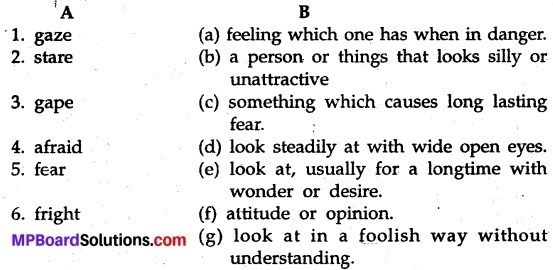
Answer:
1. (e); 2. (d), 3. (g), 4. (a), 5. (c), 6. (b).
F. Identify the theme of the lesson and list some more vocabulary items pertaining to the theme.
Answer:
The poet scolds the servant for being late in cooking food. He also scolds the pauper for using the word ‘hunger’. He calls it a worthless word. It shows the poet’s false and foul play. He directs the pauper to quench his starvation with the spring breeze. However, he craves to get food earlier though he is not hungry
G. Listen and repeat: Really, haven’t, belly, azure, minute, moment, hours, ours, sneeze.
Answer:
For self-attempt.
Comprehension
A. Answer each of the following questions in about, 25 words.
1. Compare the needs of the poet and the pauper.
2. Why did Bashambad need a job?
3. Why does Bashambad say that breeze was enough to satisfy one’s belly and nothing else was needed.
4. What class of people do Kunja Babu and Bashambad represent?
Answer:
1. Both the poet and the pauper needed something to wrap their bodies with, to avoid chilL Both were hungry. They needed something solid to eat.
2. Bashambad was starving. He had a little rice at half past ten and hadn’t had a bite since then. He needed a job to earn money for food. His hunger made him need a job.
3. Bashambad said that he needed something solid to remain alive. The poet got enraged and asked him to go away and eat rice, dal and curry to his fill. The pauper asked the poet where he should get those things. On seeing the poet angry, the pauper said that breeze was enough to satisfy one’s belly and nothing else was needed.
4. Kunja Babu was a celebrated poet. He belonged to the rich society. He owned a house, a lovely garden and even a cook. He led a luxurious life. He had woollen clothes. Bashambad represents the poor society. He needed work to earn food. This shows he lived like a pauper from hand to mouth. He did not have even a shawl to avoid shivering.
B. Answer each of the following questions in about 50 words:
1. Why so late? Does it take two hours to get the food ready? Characterise Kunja Babu in the light of his above statement.
2. Describe in brief the condition of the pauper.
Answer:
1. Kunj Babu was an idealist. He was not a practical man. He asked the pauper not to use the word ‘hunger’. He advised him not to make a fuss of his hunger. He bade him go away and satisfy his hunger there. Though it was the time for dinner yet he was not ready to feed an actually hungry person. He told the pauper that the spring breeze would suffice for all his needs. Soon after he scolds .The servant for preparing the dinner late. He lacked coordination in his thoughts, words and actions.
2. The pauper was not a beggar. He did not beg for food. He needed a job to satisfy his hunger. He could not help thinking about hunger though he was asked not to mention it. He agrees unwillingly to accompany the poet to his garden. The spring breeze made him sneeze and cough. It worsened his condition. His teeth started chattering. He had no shawl to save him from cold. He had a bitter experience at the poet’s house. The poet bade him go away. He was treated like a beggar.
The Poet and the Pauper Grammar
A. Study these sentences occurred in a dialogue.
- Kunja : This is no place for you-you are trespassing.
- Bashambad : I’ll go at once.
- Kunja : I’m glad to hear you say so.
- Bashambad : There’s a chill in the air.
The above are the speakers’ exact words : Direct speech is found in conversations in books, in plays, and quotations. In indirect speech we give the exact meaning of a remark or speech, without necessarily using the speakers’ words.
Examples : Thus we can write the aforesaid dialogue.
- Kunja said that was no place for him. He was trespassing.
- Bashambad said that he would go at once.
- Kunja said that he was glad to hear him say so.
- Bashambad said that there was a chill in the air.
- Put the following statements into indirect speech.
Question 1.
Bashambad : I’m thinking even more about it now than I usually do. I had a little rice at half-past ten before I set out job hunting, and I haven’t had a bite since then.
Answer:
Bashambad told the poet that he was thinking even more about that then than he usually did. He had had a little rice at half-past ten before he had set out job hunting, and he hadn’t had a bite since then.
Question 2.
Kunja : If you must go on wheezing like this, you should wrap yourself in a blanket and huddle in a comer of your room.
Answer:
Kunja warned the pauper that if he must go on wheezing like that, he should wrap himself in a blanket and huddle in a comer of his room.
Speaking activity
A. You have gone through the one act play. Now sit in pairs and deliver the following dialogues with proper intonation.
Kunjabihari : What brings you here, my good man?
Bashambad : Sir, I,m starving. You’d talked about a job
Kunjabihari : A job ! work ! Who thinks of work in this sweet autumn weather?
Bashambad : No one does so of choice, sir, it’s this hunger that-
Kunjabihari : Hunger? Fie, fie, what a mean, paltry word ! Pray, do not repeat it before me!
Answers:
Kunjabihari : What do you want, man?
Bashambad : Sir, I want some work to earn money and satisfy my hunger.
Kunjabihari : Don’t talk of work in this fine autumn weather.
Bashambad : Hunger knows no season, Sir.
Kunjabihari : Beware! Don’t repeat the cursed word ‘hunger’.
B. What is the message conveyed to us by the one act play? You start like this:
Answer:
In my opinion the play conveys a very important message.Even the hungry person does not realise the genuine need of another hungry person. The hungry person needs food more than hol- low advice. The opinion of the strong is an order for the weak.
Writing Activity
A. Suppose you are Bashambad Babu, who has always been subdued, express how you feel at last. (50 words)
Answer:
I am Bashambad Babu. One day I was feeling hungry. I t told my problem to a poet. He checked me from repeating the word ‘hunger’. I agreed but I could not help thinking about hunger. I had not eaten anything since late morning. The poet stressed that moon beams, nectar of flowers and the spring breeze might suffice for all the needs. Again I was subdued. The poet bade me go out and eat rice to my fill. He got angry when I asked him for the place. At last, I was made to accompany him to the garden without a shawl. 1 I fell a victim to cough and cold. In the end, 1 challenged him and , felt free.
B. Discuss how the differences in stature of the poet and the poor man are depicted. Write whom do you admire more and why? (150 words)
Answer:
The poet and the poor man are world apart in stature. The poet is a worshipper of nature. He is least hospitable. Though he is himself hungry yet he does not feel the urgent need of the hungry pauper. Though it is dinner time yet he does not offer food or work to tire hungry pauper. He asks the pauper in a taunting manner to go away and feed himself on rice, dal and curry. It was a cruel joke. This was not a suggestion but a sarcastic remark.
He sermonises that moon beams, the nectar of flowers and the spring breeze meet all needs. He makes fun of the pauper when his teeth chatter in cold. The pauper is hungry. He needs work. He relates his problem , before a poet. The poet ridicules him. Though he is checked from repeating the word ‘hunger’ it does not get out of his mind. He does not enjoy the scenic beauty because he has no shawl.They have different physical, mental and financial statures.
Think it over
A. If a man is hungry his mind will be preoccupied with the thought of food. It would be difficult for him to talk about poetic expressions. But often poets and writers had gone through these unfulfilled basic demands and created master pieces. How?
Answer:
Poets are saintly and superhuman beings. They rejoice themselves in the lap of nature. They renounce all their pleasures. They forget food, drink and clothes. Their minds are never preoccupied with the thought of meeting their physical needs. They engross themselves in poetic pleasures. Many poets and writers”have led a life of want and penury. Yet they have created many pieces. It is due to their dedication and concentration in their own field.
B. Humour is the brighter part of life. Finding humour in day to day life generates optimistic view. Do you feel so?
Answer:
Life is an admixture of humour and pathos Humour is the brighter part of life. It lends us joy and cheer. Humour is spice of life. It creates special flavour. Pathos on the other hand creates an atmosphere of sadness and sorrow. It is never liked in any society.
Finding humour in day to day life generates optimistic view or the hopeful view of things. I also feel so,.
Things to do
Stage the one act play.
Take help of your teacher and your friends.
Answer:
Class-room Activity.
The Poet and the Pauper Additional Questions
Short-Answer Type Questions (In about 25 Words)
Question 1.
Give an account of the Autumn Season.
Answer:
India is a land of seasons. The autumn season is one of them. Tine poet calls it as sweet and charming. The evenings during autumn season are serene, tranquil and beautiful. The moon beams, the nectar of flowers and the breeze fulfill all the needs. The chill of the air is pleasant.
Question 2
Give an account of the pauper’s meeting with the poet
Answer:
A pauper came to the house of a poet. He asked the poet to give him a job because he was starving. The poet snubbed him of thinking of work in the sweet autumn weather. He also warned him against repeating the word ‘hunger’. The pauper sealed his tongue against his will. The poet suggested him to accompany him to the garden. The pauper agreed. However, he caught cough and cold and went away hungry.
Question 3
What does the lesson tell you about the pauper?
Answer:
A pauper was feeling hungry. He asked a poet for work.
The poet asked him to go away and eat rice, dal and curry. It was a cruel joke. The pauper could not get them anywhere.The poet bade him accompany him to his garden to enjoy the beauty of the night. The pauper agreed. The chilly air made him sneeze and cough. He had no wrap. He was forced to go away in order to save himself.
Question 4.
What does the lesson tell you about the poet?
Answer:
The poet was a fan of nature. He told the hungry pauper that the moon beams, the nectar of flowers and the spring breeze would suffice for all his needs. He did not realise that the hungry people did not relish poetic solutions and humorous talks. He was selfish. He himself was hungry but he did not give weight age to pauper’s need for food.
Long-Answer Type Question
Question 1.
Give an account of beggars in India.
Answer:
Begging is a profession in India. Beggars wear rags. Some beggars cover their bodies with ashes. Most of them are crippled or blind. Some beggars sit by the roadsides or outside their shrine.They cry and weep as if they are very hungry Beggars get every-thing without doing anything. Sadhiis and faqirs are also patronised by religious-minded people. Most of the beggars are idlers. They cause a great loss of labour to the nation. Their manual labour could have been utilised in mills and factories. They would have produced useful work. Some beggars arouse pity in the hearts of passers-by in the name of Allah. The healthy beggars should not be given any alms.
The Poet and the Pauper Summary in English
A pauper wanted a job from a poet because he was hungry. The poet said that it was foolish to think of work amidst sweet autumn weather. The poet advised him to enjoy the beauty of the moonlit night. The pauper needed some thing solid to eat. The poet asked him to go and eat rice, dal and curry to his fill. The pauper did not know where he could get them. He declared that he would fill his belly with breeze.
Both of them went out in the chilly air. The poor man started shivering because he had no wrap. The poet wrapped his shawl, closely. He called it a warm weather. The pauper agreed with him that , there was no cold. The poet praised the scenic beauty but the pauper started sneezing and coughing. The poet kept humming a poem and the pauper kept wheezing. The poet called him a kill joy (nuisance). He also bade him leave the garden. The pauper had to leave to save his life. The poet kept gazing at the moon. He scolded his servant for preparing the dinner late.
The Poet and the Pauper Summary in Hindi
एक दरिद्र व्यक्ति को एक कवि से काम चाहिए था क्योंकि वह भूखा था। कवि ने कहा कि मधुर पतझड़ के मौसम में काम के बारे में विचार करना मूर्खता है। कवि ने उसे नसीहत दी कि चांदनी रात के सौन्दर्य का आनन्द ले। दरिद्र को खाने के लिए कोई ठोस पदार्थ चाहिए था। कवि ने उससे कहा कि जाकर चावल, दाल और कढ़ी से अपना पेट भर ले। दरिद्र को यह ज्ञात नहीं था कि वे वस्तुएँ उसे कहां उपलब्ध होंगी। उसने घोषणा की कि वह हवा खाकर अपना पेट भर लेगा।
वे दोनों चिलचिलाती हवा में बाहर निकल गए। दरिद्र व्यक्ति ने काँपना शुरू कर दिया क्योंकि उसके पास कोई शाल नहीं था। कवि ने कसकर अपना शाल लपेट लिया। उसने मौसम को उष्ण बताया। दरिद्र उस के साथ सहमत हो गया और बोला कि सर्दी नहीं है। कवि ने नजारे की सुन्दरता की सराहना की परन्तु दरिद्र ने छींकना और खाँसना शुरू कर दिया। कवि एक कविता को गुनगुनाता रहा और दरिद्र पराई हुई आवाज में सांस लेता रहा। कवि ने उसे गुड़-गोबर करने वाला (कढ़ी बिगाड़/वाहियात व्यक्ति) कहा। उसने उसे बाग से चले जाने का भी आदेश दिया। अपना जीवन बचाने के लिए दरिद्र को जाना पड़ा। कवि एकटक दृष्टि से चांद को देखता रहा। देरी से भोजन बनाने के लिए उसने अपने नौकर को फटकारा।
The Poet and the Pauper Word-Meanings
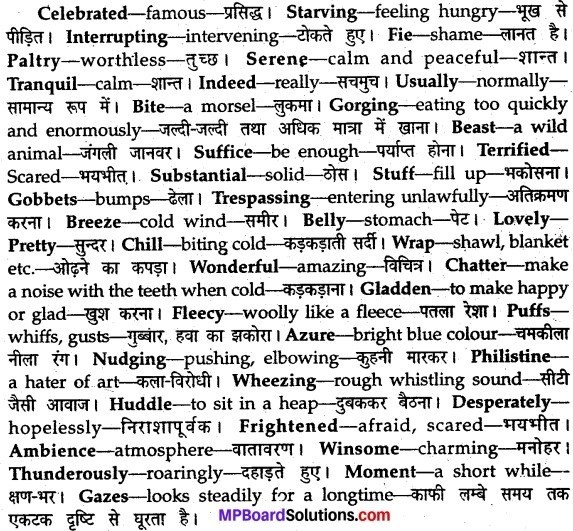
We believe the information shared regarding MP Board Solutions for Class 9 English The Rainbow Solutions Chapter 12 The Poet and the Pauper Questions and Answers as far as our knowledge is concerned is true and reliable. In case of any queries or suggestions do leave us your feedback and our team will guide you at soonest possibility. Bookmark our site to avail latest updates on several state board Solutions at your fingertips.

